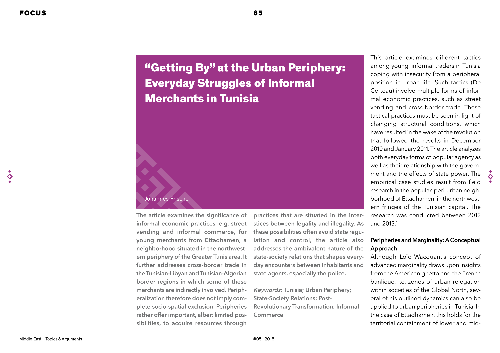“Getting By” at the Urban Periphery: Everyday Struggles of Informal Merchants in Tunisia
The article examines the significance of informal economic practices, e.g. street vending and informal commerce, for young merchants from Ettadhamen, a neighborhood situated in the northwestern periphery of the Greater Tunis area. It further addresses cross-border trade in the Tunisian-Libyan and Tu...
Sábháilte in:
| Foilsithe in: | Middle East - Topics & Arguments |
|---|---|
| Príomhchruthaitheoir: | |
| Formáid: | Artikel (Zeitschrift) |
| Teanga: | Béarla |
| Foilsithe / Cruthaithe: |
Philipps-Universität Marburg
2015
|
| Ábhair: | |
| Rochtain ar líne: | Rochtain ar líne |
| Clibeanna: |
Níl clibeanna ann, Bí ar an gcéad duine le clib a chur leis an taifead seo!
|
| Achoimre: | The article examines the significance of informal economic practices, e.g. street vending and informal commerce, for young merchants from Ettadhamen, a neighborhood situated in the northwestern periphery of the Greater Tunis area. It further addresses cross-border trade in the Tunisian-Libyan and Tunisian-Algerian border regions in which some of these merchants are indirectly involved. Peripheralization therefore does not imply complete socio-spatial exclusion. Peripheries rather offer important, albeit limited possibilities, to acquire resources through practices that are situated in the interstices between legality and illegality. As these possibilities often avoid state regulation and control, the article also addresses the ambivalent nature of the state-society relations that shapes everyday encounters between inhabitants and state agents, especially the police. |
|---|---|
| DOI: | 10.17192/meta.2015.5.3521 |
